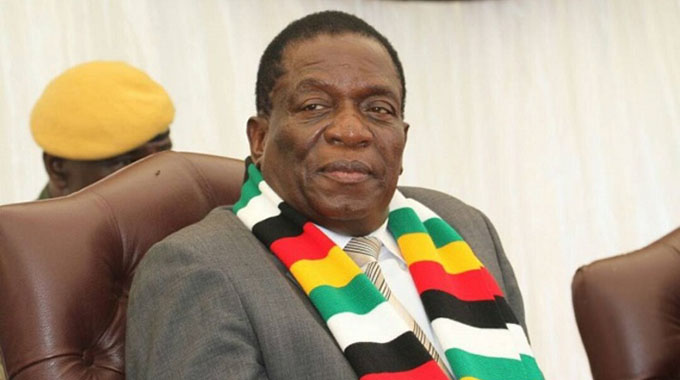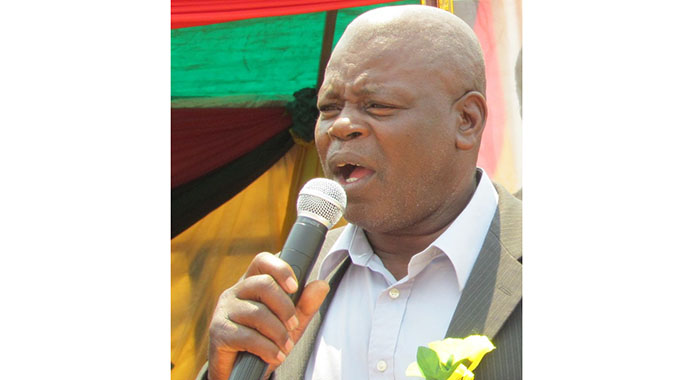ED’s burden of reform . . . from international relations to Twitter, ED’s mission that must not fail

Tichaona Zindoga Acting Editor
Many who wish the President of Zimbabwe well — and these are the majority that voted for him in elections a short seven months ago — want ED Mnangagwa to succeed and carry out reforms that usher in the epochal change from the First to the Second Republic.
He is the reformist.
The reforms are ongoing and can only gather momentum: from big calls on international relations, through change of political culture to seemingly banal issues such as choosing to communicate with the world via Twitter.
Yet, there are equally many people who are averse to reform and would rather President Mnangagwa buckle up back to Zimbabwe’s “default”: a state where the country does not grow economically, the ruling party does not reform, the political culture remains toxic and polarised and the country remains a pariah — that sort of typical African country hogging the global limelight for all the wrong reasons.
We have been down that road before.
Consider the situation over the past fortnight or so, again. Western media telling the world that Zimbabwe has “relapsed . . . after showing signs” of reform.
In the words of Peter Hain, a British Labour Party peer, “ . . . Any hope of promised ‘New’ Zimbabwe with international investment (is) now dead”.
A South African opposition party pushing for Zimbabwe to be subjected to the International Criminal Court for alleged crimes against humanity.
Harriet Baldwin , the British Africa Minister saying that: “The UK would not support Zimbabwe’s membership of the Commonwealth at this time because of credible reports of human rights violations by security forces.”
Now, even, there are talks of Britain threatening to impose sanctions on Zimbabwe. There, curiously, has been a lot of discussions of Zimbabwe in the UK Parliament.
And Sky News, a British broadcaster, says Zimbabwe is a “lawless country”, leading the charge of media flocking back to the country for a familiar script. We are told this is Zimbabwe in default. There are a couple of international forums, some forthcoming, where Zimbabwe will likely be a subject and the desperate call is to portray a Zimbabwe that has not changed.
A key question emerges: who is served by the perceived default in Zimbabwe?
The politics of change management
Students of management will quickly relate how resistance to change — whether passive or active — builds. According to scholars, people resist change for a number of reasons, among others; fear of job losses, loss of prestige, change of management structure, need to learn new things and change of work stations.
This will be a fundamental prism to look at ED’s domestic reforms. On the other hand, if you consider the international relations, the position is not dissimilar.
Peter Hain hails from the political side of Britain — the Labour Party — that is largely responsible for the two-and-a-fifth decades stand-off between Zimbabwe and its former coloniser. A few months ago he appeared to warm up to Zimbabwe and even pursued a rare opportunity for investment in favour of the country. Yet his recent remarks suggest someone who is back in familiar territory, and happy for it.
A “reformed” Zimbabwe is a difficult proposal for those that cannot quite process change or reform; that is, how to deal with it. The worst example is represented by that British Lord who called for the recolonisation of the country.
Such atavism! Yet, it’s a strangely familiar way of failing to countenance change.
Americans would rather take the easy road of maintaining sanctions against Zimbabwe rather than the brave new path of giving ED a chance based on his reforms. Back home, things are not different. Before an outline of the reforms is discussed, it bears recalling the change dilemma alluded to above. ED’s pursuit of reforms could be stalled and these are genuine and legitimate fears by people who are served by disrepair and dysfunctionality.
Two key examples would suffice.
Politically, ED’s change of political culture towards inclusiveness and dialogue, while widely hailed as a positive step, is being upset by the politics of binaries that serve clicks within the opposition (and civil society) and within Zanu-PF itself.
On either side, a new political culture would render some individuals redundant. Nelson Chamisa of the MDC-Alliance, the country’s biggest opposition party, does not want dialogue and reform and scuppers efforts towards that by raising the cost of dialogue to mean power sharing. He of course does not deserve to share power to the extent that the constitution does not accord him that outside of an election. He lost the last elections in July 2018.
The opposition and Chamisa could find strange bedfellows in a Zanu-PF clique that works to frustrate the President’s reform agenda. Odd as it sounds, some people thrive — or imagine thriving — with Zimbabwe always facing an external threat, real or imagined. Not to mention, either, that a dark night of lawlessness and international isolation is a perfect cover for looting and primitive accumulation.
Economically, reforms such as disbanding leeching and wasteful enterprises; breaking down cartels, stopping patronage, sniffing out ghost workers; jailing looters and so on, could easily breed resentment against ED, from within, hence effort to frustrate his agenda.
Reforms ED must carry out, anyway
(a) Economic Reforms
This is an expansive area with many dynamics. The challenge for ED — which he is overcoming — begins with adopting a particular model. ED is neither looking East nor West. Perhaps forward is the general direction. Zimbabwe is open for business. With his Finance Minister, Mthuli Ncube, the reform agenda is largely one built around austerity, redolent of the 1970s-80s Britain.
Minister Ncube has underlined austerity as basis for prosperity. The President’s marquee policy is Vision 2030, that is, transforming Zimbabwe into an upper middle income economy by 2030, according to World Bank metrics. Reforms in this regard also entail breaking up the old economy by discarding or revamping useless enterprises that were a drain to the economy, of course to the advantage of a few elites. The anti-corruption fight should be read in this context, too.
(b) Political Reforms
A key motif of this discussion is to relate how ED’s friend and foe may resist change. Since coming in, President Mnangagwa has opened up the country’s democratic space and sought to inculcate a different political culture of tolerance and peace. The Zanu-PF of Emmerson Mnangagwa is of a way different temperament from that of his predecessor.
The institution of the party is no longer violently combative and thanks to ED’s temperament — the elections last year were conducted in a strangely peaceful environment without familiar orgies of violence and blood-letting. Unfortunately, for ED, this is something not exactly acceptable both to friend and foe.
We saw it. Some hawks in the ruling party think that ED is too soft. His lack of desire for violent confrontations make them irrelevant, in their dubious conceptualisation of revolutionary fervour. On the other hand, a violence-free Zimbabwe takes away a key bargaining and legitimacy chip from the opposition who thrive on being victims of Zanu-PF. Reform towards an open and tolerant political culture is thus critical for ED.
(c) International Re-engagement
There are currently significant efforts to frustrate Zimbabwe’s reintegration into the global family of nations. Of course that is a euphemism for being in good books with the West. The growing vibe coming from Britain, being championed by some interests, is instructive. The Americans have maintained a hard stance. The hope is to upset ED’s re-engagement prospects. It is easier to deal with the pariah.
ED will have to dig deep into his wealth of patience and strategy to keep re-engagement and dialogue on course, which will build a legacy for him and help the country immensely after decades of isolation.
(d) Accountability and transparency
Last year, following the August 1 post-election violence, ED took a bold step by appointing the seven-member Motlanthe Commission. He showed the world that he was committed to accountability and ending impunity. ED bit the bullet.
He went further: he made public the report, surprising (irking even) different interests. Accountability and transparency by the ED Government will be key reform pillars. And it has shown that the President and country could get a lot of goodwill that.
(e) A listening (and dialoguing) leader
One of the earliest slogans of the Zimbabwean leader was that he was a listening President and he divined that, “The Voice of the People, is the Voice of God”. A listening President does all of the above — the reforms that Zimbabwe needs — and more.
President Mnangagwa has opened the door for national dialogue — meeting leaders of political, religious, civil society groupings. And so forth. He is likely to continue on that path, until a truly national consensus is reached, anchored on the understanding that the nation needs to engage itself, find each other and build the country.
The result will be a harmonious and less polarised society that is beset by toxic binaries — characterising the country right now. And whether it will be a rally in Dotito, a “town hall” meeting in Borrowdale, or a post on Twitter, the President is going to get all sorts of inter-locution.
He should continue to listen and engage.
It is the burden of reform.










Comments